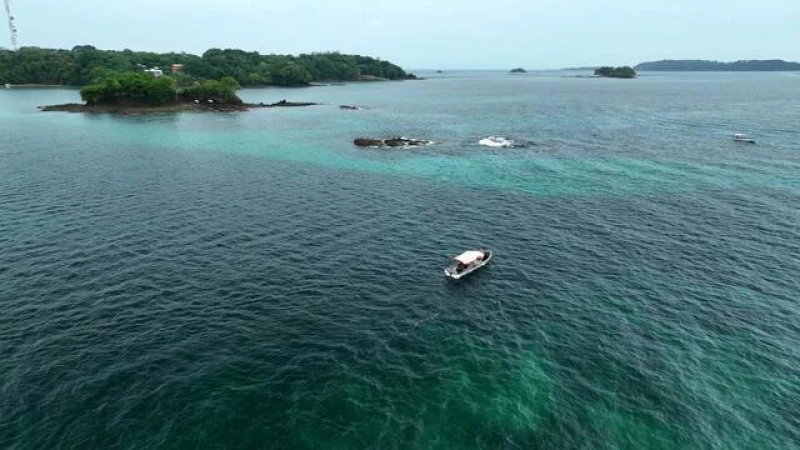Rights of Nature: Panama's Country-Wide Law
We've all heard of human rights and civil rights, but what about the rights of nature? A growing global movement is working to give plants, animals and ecosystems some of the same legal protections as humans, and in some countries, it's leading to new legislation.
Panama is one of the only nations in the world with a country-wide rights of nature law. The legislation was just used to help shut down one of the largest copper mines in the world.
Callie Veelenturf was the driving force behind the law. The 31-year-old Massachusetts native is a marine biologist who has been studying sea turtles for almost a decade. Veelenturf is a National Geographic explorer who founded the Leatherback Project, which tracks and protects the giant but endangered turtle species. The leatherbacks are threatened by fishing nets, rising seas that erode their nesting beaches and plastic pollution.
Veelenturf has made it her life's work to protect these creatures, but that work took an unexpected turn in 2018, when she took legal action to protect herself from sexual harassment.
Rights of Nature: A New Approach to Environmental Protection
Veelenturf, an environmental activist, recently had a revelation about the limitations of our legal systems when it comes to protecting the rights of nature. "I realized that we can't defend the rights of nature as I had just defended my rights, because nature largely has no rights in our legal systems," Veelenturf explained.
Veelenturf's perspective shifted after she came across a book titled "The Rights of Nature: A Legal Revolution That Could Save the World" by David Boyd, a renowned environmentalist. The book argues that all living things and ecosystems should have the fundamental right to exist and thrive, just like humans. It proposes that nature's rights, similar to human rights, can be defended in court. Veelenturf was inspired by this concept and felt a sense of purpose. She said, "I was like, 'This is a mission of mine. I have to do what I can to advance this concept.'"
The concept of the rights of nature goes beyond protecting individual species or habitats. It aims to defend entire ecosystems, such as the Amazon rainforest, and prevent developments that would harm wildlife populations. This approach is more radical than traditional environmental protections, which focus on limiting human exploitation of nature, rather than recognizing nature's inherent right not to be exploited.
Veelenturf emphasized that this approach prioritizes the needs of ecosystems over the needs of humanity. She believes it is crucial for this concept to be based on scientific evidence and not be dismissed as radical. "I think it's important that this concept not become radicalized because it's based in factual, scientific need," Veelenturf said.
Panama Joins Ecuador and Bolivia in Recognizing Rights of Nature
A new legislation passed in Panama has made it the third country, alongside Ecuador and Bolivia, to recognize the rights of nature on a national level. The idea was proposed by environmental activist Veelenturf, who presented it to Panama's first lady and members of the country's parliament.
Veelenturf expressed surprise at the overwhelming support the idea received, stating, "It was immediately something everybody latched onto, and that was so encouraging to me, because it was the opposite of what I was expecting really."
Congressman Juan Diego Vasquez played a key role in passing the legislation. He emphasized that every Panamanian citizen, as well as any human, can use this bill to defend the rights of nature in court. Vasquez stated, "This will not be a bill that it's gonna be left in a cabinet. It's going to be used when it needs to be used."
The new law has already had a significant impact. Panama's Supreme Court recently utilized the legislation to shut down a $10 billion coller mine, which had faced opposition due to its potential threat to tropical jungles and water supplies.
Ecuador has also seen the rights of nature in action, with a copper mine being blocked for violating the rights of a nearby forest. In India, although there is no nationwide law, a court has recognized the rights of the Ganges River, ruling that polluting it is akin to harming a person.
Communities in the United States Recognize Nature's Legal Rights
Communities in the United States are following the lead of countries like New Zealand and Ecuador by recognizing the legal rights of nature. In 10 states, dozens of local communities have passed laws that acknowledge nature's inherent rights.
Seattle, for example, recently recognized the rights of salmon to pass through its dams, while North Carolina is considering granting rights to the Haw River ecosystem. These efforts are being supported by organizations like the Center for Democratic and Environmental Rights.
According to environmental activist John Veelenturf, these initiatives provide a new way of interacting with nature. "What we're doing now is obviously not working, and so this provides a different way of interacting with nature. I think we're at a point now where it's worth a shot," Veelenturf said.







